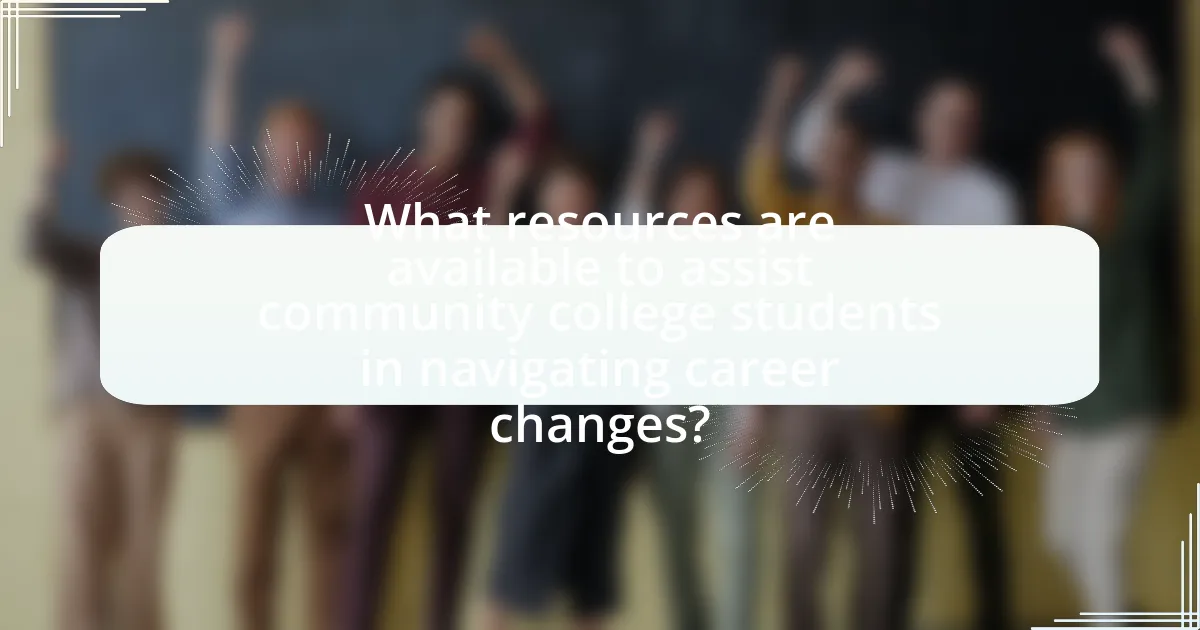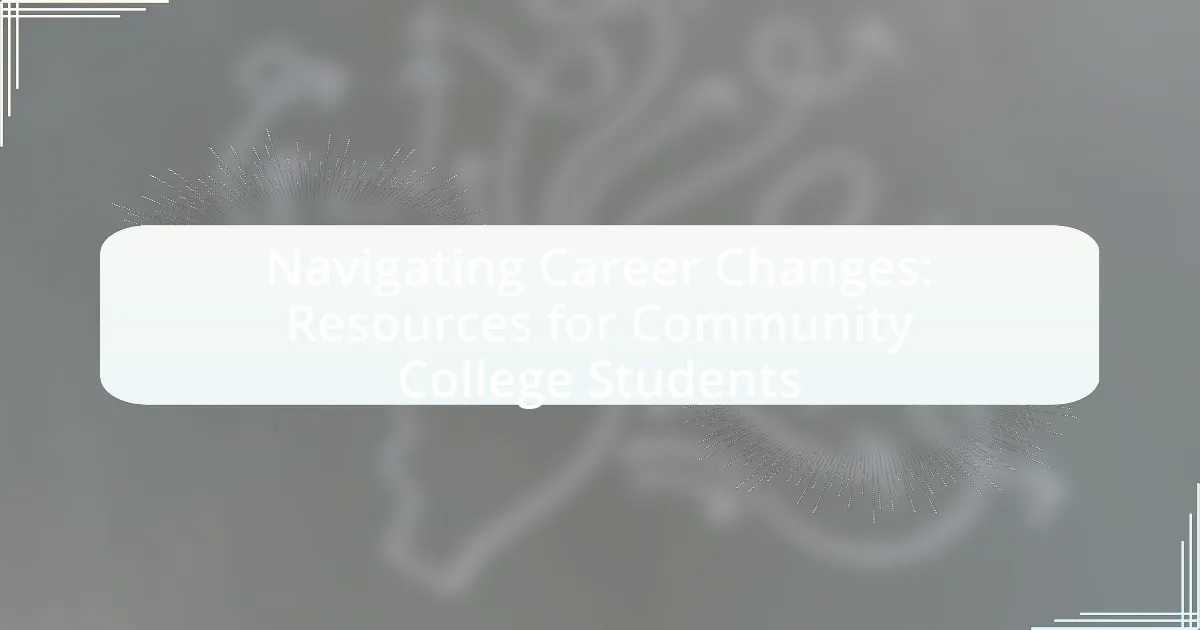The article focuses on the challenges faced by community college students during career changes, highlighting key issues such as financial constraints, lack of guidance, and balancing personal responsibilities. It examines how personal circumstances, financial stability, and family obligations impact students’ ability to transition into new careers. Additionally, the article discusses essential skills for successful career changes, available resources like career counseling and online platforms, and strategies for effective networking. It emphasizes the importance of continuous learning and practical experience through internships or volunteer work in enhancing employability and achieving career objectives.

What are the key challenges faced by community college students during career changes?
Community college students face several key challenges during career changes, including financial constraints, lack of guidance, and balancing responsibilities. Financial constraints often limit students’ ability to afford tuition and related expenses, which can hinder their ability to pursue new career paths. A lack of guidance from career services can leave students feeling unsupported in navigating job markets and educational requirements. Additionally, many community college students juggle work, family, and academic commitments, making it difficult to dedicate time to career exploration and skill development. These challenges are supported by research indicating that financial stress and inadequate career counseling significantly impact students’ ability to successfully transition into new careers.
How do personal circumstances impact career transitions for community college students?
Personal circumstances significantly impact career transitions for community college students by influencing their availability, motivation, and access to resources. Factors such as financial stability, family responsibilities, and personal health can dictate the time and energy students can dedicate to their studies and job searches. For instance, a study by the American Association of Community Colleges found that 60% of community college students work while attending school, which can limit their ability to engage in internships or networking opportunities essential for career advancement. Additionally, students with caregiving responsibilities may face challenges in balancing their educational commitments with family needs, further complicating their transition into the workforce.
What role does financial stability play in the decision-making process?
Financial stability significantly influences the decision-making process by providing individuals with the confidence and resources necessary to make informed choices. When individuals experience financial stability, they are more likely to pursue opportunities such as further education or career changes, as they can afford to take risks without the immediate pressure of financial insecurity. Research indicates that financial stability reduces stress and enhances cognitive function, allowing for clearer and more rational decision-making. For instance, a study by the Urban Institute found that individuals with stable financial backgrounds are more likely to invest in their education and career development, leading to better long-term outcomes.
How do family responsibilities affect career change opportunities?
Family responsibilities significantly limit career change opportunities by imposing time constraints and prioritizing caregiving duties over professional development. Individuals with family obligations often face challenges in pursuing further education or training, which are essential for transitioning to new careers. Research indicates that 70% of working parents report that family commitments hinder their ability to seek new job opportunities, as they must balance work with childcare and household responsibilities. This dynamic often leads to a preference for stable employment over riskier career changes, thereby reducing overall mobility in the job market.
What external factors influence career changes for community college students?
External factors influencing career changes for community college students include economic conditions, labor market trends, and family responsibilities. Economic conditions, such as recessions or booms, directly affect job availability and stability, prompting students to shift their career paths. Labor market trends, including the demand for specific skills or industries, guide students in selecting programs that align with emerging job opportunities. Additionally, family responsibilities, such as caregiving or financial obligations, can necessitate changes in career focus or the pursuit of more flexible job options. These factors collectively shape the decisions community college students make regarding their career trajectories.
How does the job market affect students’ career choices?
The job market significantly influences students’ career choices by shaping their perceptions of job availability and salary potential. When students observe high demand for specific skills or professions, they are more likely to pursue those fields to enhance their employability. For instance, according to the U.S. Bureau of Labor Statistics, occupations in healthcare and technology are projected to grow substantially, prompting students to focus their studies in these areas to align with market needs. This alignment between educational pursuits and job market trends helps students make informed decisions that increase their chances of securing stable employment after graduation.
What impact do industry trends have on career transition decisions?
Industry trends significantly influence career transition decisions by shaping job availability, required skills, and potential salary ranges. For instance, the rise of technology and automation has led to increased demand for skills in data analysis and software development, prompting individuals to pursue training in these areas. According to the U.S. Bureau of Labor Statistics, occupations in technology are projected to grow by 11% from 2019 to 2029, indicating a strong market for those transitioning into tech-related fields. Additionally, awareness of industry trends helps individuals align their career goals with sectors that are expanding, thereby enhancing their employability and job security.
What skills are essential for successful career changes?
Essential skills for successful career changes include adaptability, communication, and problem-solving. Adaptability allows individuals to adjust to new environments and roles, which is crucial when transitioning to a different career. Effective communication skills enable clear expression of ideas and collaboration with new colleagues, facilitating smoother integration into a new workplace. Problem-solving skills are vital for overcoming challenges that arise during the transition, as they empower individuals to find innovative solutions in unfamiliar situations. Research indicates that these skills are consistently sought after by employers, making them critical for career advancement and success in new fields.
How can students identify transferable skills from their current education?
Students can identify transferable skills from their current education by analyzing the competencies they develop through coursework, projects, and extracurricular activities. For instance, critical thinking, communication, teamwork, and problem-solving are common skills gained in various academic settings. Research indicates that 70% of employers prioritize these soft skills when hiring, highlighting their relevance across different job sectors. By reflecting on specific assignments or group projects, students can pinpoint instances where they utilized these skills, thereby recognizing their applicability in future career opportunities.
What new skills should students consider acquiring for their desired careers?
Students should consider acquiring digital literacy, critical thinking, and communication skills for their desired careers. Digital literacy is essential as most industries increasingly rely on technology; for instance, a report by the World Economic Forum indicates that 94% of business leaders expect employees to have digital skills. Critical thinking enhances problem-solving abilities, which are crucial in dynamic work environments; research from the Association of American Colleges and Universities shows that 93% of employers value critical thinking in job candidates. Effective communication skills are vital for collaboration and conveying ideas clearly, as highlighted by a LinkedIn survey where 57% of hiring managers prioritize communication skills in candidates.

What resources are available to assist community college students in navigating career changes?
Community college students can access various resources to assist in navigating career changes, including career counseling services, online job boards, and workshops. Career counseling services provide personalized guidance, helping students identify their skills and interests while exploring potential career paths. Online job boards, such as Handshake and Indeed, offer listings tailored to students, facilitating job searches and internships. Workshops on resume writing, interview techniques, and networking skills further equip students with essential tools for successful transitions. These resources collectively enhance students’ ability to adapt to new career opportunities effectively.
How can career services at community colleges support students?
Career services at community colleges support students by providing essential resources such as career counseling, job placement assistance, and skills development workshops. These services help students identify their career goals, enhance their employability, and connect with potential employers. For instance, a study by the National Center for Education Statistics found that students who utilized career services were more likely to secure employment after graduation compared to those who did not. Additionally, community colleges often collaborate with local businesses to create internship opportunities, further bridging the gap between education and employment.
What types of counseling and guidance do career services offer?
Career services offer various types of counseling and guidance, including career exploration, resume writing assistance, interview preparation, job search strategies, and networking advice. These services are designed to help individuals identify their career interests, develop effective job application materials, prepare for interviews, and connect with potential employers. Research indicates that students who utilize career services are more likely to secure employment after graduation, highlighting the effectiveness of these resources in facilitating successful career transitions.
How can workshops and seminars enhance students’ career readiness?
Workshops and seminars enhance students’ career readiness by providing practical skills, networking opportunities, and industry insights. These events often feature professionals who share real-world experiences and expectations, helping students understand the job market better. For instance, a study by the National Association of Colleges and Employers found that 80% of employers prefer candidates with relevant experience, which workshops can facilitate through hands-on activities and simulations. Additionally, networking during these events allows students to connect with potential employers and mentors, further increasing their employability.
What online resources can students utilize for career exploration?
Students can utilize various online resources for career exploration, including websites like ONET Online, CareerOneStop, and LinkedIn Learning. ONET Online provides detailed information about different occupations, including job descriptions, required skills, and salary data, which helps students understand potential career paths. CareerOneStop, sponsored by the U.S. Department of Labor, offers tools for job searching, resume building, and career assessments, enabling students to identify their interests and match them with suitable careers. LinkedIn Learning offers a wide range of courses that can help students develop skills relevant to their desired careers, enhancing their employability. These resources collectively support informed decision-making in career exploration.
Which websites provide valuable job market insights and career advice?
Websites that provide valuable job market insights and career advice include Glassdoor, LinkedIn, Indeed, and CareerBuilder. Glassdoor offers company reviews, salary information, and interview tips, making it a comprehensive resource for job seekers. LinkedIn not only connects professionals but also provides articles and insights on industry trends and career development. Indeed aggregates job listings and offers salary comparisons and company reviews, while CareerBuilder provides career tests and job search resources tailored to various industries. These platforms are widely recognized for their reliability and the breadth of information they offer to individuals navigating career changes.
How can online courses help students develop new skills for career changes?
Online courses can help students develop new skills for career changes by providing flexible, accessible learning opportunities tailored to specific industry needs. These courses often focus on in-demand skills, such as digital marketing, coding, or project management, which are essential for transitioning into new career paths. According to a report by the World Economic Forum, 94% of business leaders expect employees to pick up new skills on the job, highlighting the importance of continuous learning. Furthermore, online platforms like Coursera and Udacity offer courses developed in collaboration with leading companies, ensuring that the skills taught are relevant and applicable in the current job market. This alignment with industry standards enhances employability and equips students with the necessary competencies to succeed in their new careers.
What role do networking opportunities play in career transitions?
Networking opportunities are crucial in career transitions as they facilitate connections that can lead to job opportunities and mentorship. Engaging with professionals in a desired field allows individuals to gain insights, advice, and referrals that are often not accessible through traditional job search methods. Research indicates that approximately 70% of jobs are found through networking, highlighting its effectiveness in uncovering hidden job markets. Additionally, networking can provide emotional support and encouragement during the often challenging process of changing careers, further enhancing the likelihood of a successful transition.
How can students effectively network with industry professionals?
Students can effectively network with industry professionals by actively participating in industry events, utilizing social media platforms like LinkedIn, and seeking informational interviews. Engaging in industry events, such as conferences and workshops, allows students to meet professionals face-to-face, fostering personal connections. According to a survey by the National Association of Colleges and Employers, 85% of jobs are filled through networking, highlighting the importance of these interactions. Additionally, maintaining a professional online presence on platforms like LinkedIn enables students to connect with industry leaders and join relevant groups, further expanding their network. Seeking informational interviews provides students with insights into the industry while establishing rapport with professionals, which can lead to mentorship opportunities.
What events should students attend to expand their professional connections?
Students should attend networking events, career fairs, industry conferences, and workshops to expand their professional connections. Networking events provide opportunities to meet professionals in various fields, while career fairs allow students to interact directly with potential employers. Industry conferences offer insights into specific sectors and facilitate connections with experts and peers. Workshops enhance skills and provide a platform for students to engage with industry leaders, fostering relationships that can lead to internships or job opportunities.

How can community college students effectively implement their career change plans?
Community college students can effectively implement their career change plans by utilizing available resources such as career counseling, networking opportunities, and relevant coursework. Career counseling services provide personalized guidance, helping students identify their strengths and interests, which is crucial for a successful transition. Networking opportunities, including job fairs and alumni connections, allow students to build professional relationships that can lead to job placements. Additionally, enrolling in courses that align with their new career goals equips students with the necessary skills and knowledge, enhancing their employability. Research indicates that students who actively engage with these resources are more likely to achieve their career objectives, as evidenced by a study from the National Center for Education Statistics, which found that community college students who utilized career services had higher job placement rates.
What steps should students take to create a career change action plan?
Students should take the following steps to create a career change action plan: first, they need to assess their current skills and interests to identify transferable skills relevant to their desired career. This self-assessment can be conducted through tools like career assessments or reflection exercises. Next, students should research potential career paths that align with their interests and skills, utilizing resources such as informational interviews, job shadowing, and online job databases.
After identifying suitable careers, students should set specific, measurable, achievable, relevant, and time-bound (SMART) goals related to their career change. This includes outlining the necessary education or training required for the new career. Following goal setting, students should develop a timeline that includes milestones for completing educational requirements, gaining relevant experience through internships or volunteer work, and networking with professionals in the field.
Finally, students should regularly review and adjust their action plan based on progress and any changes in their interests or the job market. This iterative process ensures that the action plan remains relevant and effective in guiding their career transition.
How can students set realistic goals for their career transitions?
Students can set realistic goals for their career transitions by conducting thorough self-assessments to identify their skills, interests, and values. This foundational step allows students to align their career aspirations with their personal strengths and market demands. Research indicates that individuals who engage in self-reflection and skills assessment are more likely to achieve their career objectives, as they can tailor their goals to fit their unique profiles and the realities of the job market. Additionally, students should utilize SMART criteria—Specific, Measurable, Achievable, Relevant, and Time-bound—when formulating their goals, ensuring that each goal is clear and attainable within a set timeframe. This structured approach enhances focus and motivation, leading to more effective career transitions.
What timeline should students follow to achieve their career objectives?
Students should follow a timeline that typically spans from their first year in community college to their graduation, ideally encompassing a three to four-year period. In the first year, students should focus on exploring career options, taking introductory courses, and engaging in career counseling services. By the second year, students should declare a major, seek internships, and build professional networks. The final year should be dedicated to completing degree requirements, applying for jobs, and preparing for interviews. Research indicates that students who engage in internships during their studies are 70% more likely to secure employment within six months of graduation, highlighting the importance of practical experience in achieving career objectives.
What strategies can students use to overcome obstacles during their career change?
Students can overcome obstacles during their career change by utilizing networking, seeking mentorship, and engaging in continuous learning. Networking allows students to connect with professionals in their desired field, providing insights and potential job opportunities. Seeking mentorship from experienced individuals can offer guidance and support, helping students navigate challenges effectively. Engaging in continuous learning through courses or certifications enhances skills and knowledge, making students more competitive in the job market. Research indicates that 70% of jobs are found through networking, highlighting its importance in career transitions.
How can students maintain motivation throughout the transition process?
Students can maintain motivation throughout the transition process by setting clear, achievable goals and regularly tracking their progress. Establishing specific milestones helps students visualize their journey and fosters a sense of accomplishment as they meet each target. Research indicates that goal-setting enhances motivation by providing direction and a framework for measuring success (Locke & Latham, 2002). Additionally, students should seek support from peers, mentors, and resources available at community colleges, as social connections can significantly boost motivation and resilience during challenging transitions. Engaging in activities that align with their interests and values also reinforces commitment and enthusiasm for their career paths.
What resources are available for students facing setbacks in their career changes?
Students facing setbacks in their career changes can access various resources, including career counseling services, mentorship programs, and online job platforms. Career counseling services provide personalized guidance and support, helping students identify their strengths and explore new career paths. Mentorship programs connect students with experienced professionals who can offer advice and networking opportunities. Online job platforms, such as LinkedIn and Indeed, facilitate job searches and provide access to job postings tailored to students’ skills and interests. These resources collectively empower students to navigate challenges and successfully transition into new careers.
What best practices should students follow for a successful career transition?
Students should actively engage in networking, skill development, and career exploration to ensure a successful career transition. Networking allows students to connect with professionals in their desired fields, which can lead to job opportunities and mentorship. Skill development through internships, workshops, and relevant coursework enhances employability by equipping students with practical experience and knowledge. Career exploration, including informational interviews and job shadowing, helps students understand various roles and industries, enabling informed decisions about their career paths. These practices are supported by studies indicating that networking can significantly increase job placement rates, and hands-on experience is crucial for skill acquisition in competitive job markets.
How can students leverage internships or volunteer work to gain experience?
Students can leverage internships or volunteer work to gain experience by actively participating in relevant projects that enhance their skills and build professional networks. Engaging in internships allows students to apply theoretical knowledge in real-world settings, which can lead to improved job readiness. According to a National Association of Colleges and Employers (NACE) survey, 60% of employers prefer candidates with internship experience, highlighting the competitive advantage gained through such opportunities. Additionally, volunteer work can provide hands-on experience in specific fields, fostering valuable connections and references that can aid in future job searches.
What role does continuous learning play in adapting to new career paths?
Continuous learning is essential for adapting to new career paths as it equips individuals with the necessary skills and knowledge to meet evolving job market demands. In a rapidly changing work environment, continuous learning enables professionals to stay relevant by acquiring new competencies, enhancing their employability, and increasing their adaptability to different roles. Research indicates that 70% of employers prioritize candidates who demonstrate a commitment to lifelong learning, highlighting its importance in career advancement and transition.

Leave a Reply